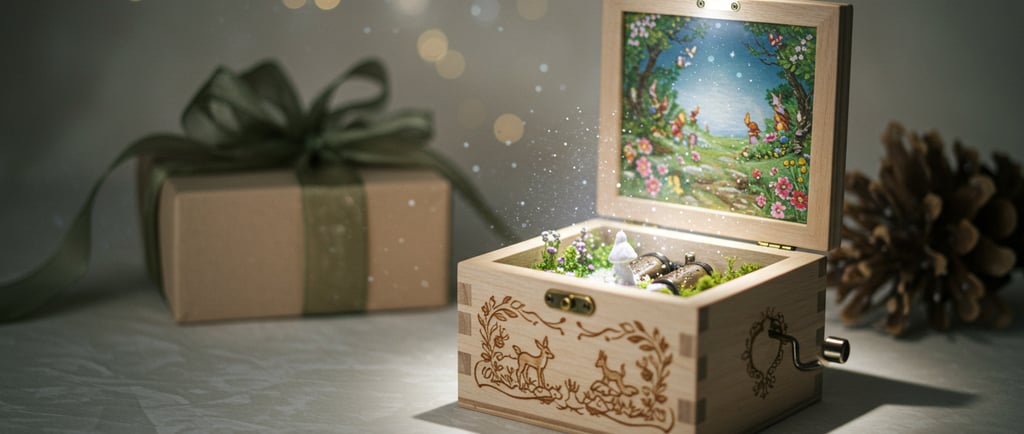Why Do We Prefer Handmade Products?
A Look into Emotional Value, Uniqueness, and Conscious Consumption Nowadays, when choosing a gift, we don't just look for something stylish or practical—we seek meaning, emotion, and a story behind the product. That's why interest in handmade goods has been rapidly growing around the world (Grand View Research, 2024). But what exactly motivates people to choose handmade products over mass-produced ones? Let’s explore the emotional and human values behind this choice.


Products Made with Love Carry More Meaning
When you hold a handmade item in your hands, you feel more than just the object—you feel the time, patience, and maybe even the emotions of its maker. Compared to mass production, handmade gifts create a deeper connection between the giver and the recipient. A study published in the Journal of Marketing (Fuchs et al., 2015) reveals that handmade items evoke a sense of “love” and “sincerity,” giving them greater emotional value. Especially on meaningful occasions, people want to offer more than a material gift—they want to send a heartfelt message. Handmade products deliver just that.
Each Piece Is One of a Kind
Another powerful reason people prefer handmade gifts is their uniqueness. Since they are crafted one by one, no two are exactly alike. This uniqueness offers a more personal and special experience to the buyer. According to a 2023 report by Rural Handmade, most customers choose handmade items because they are “customizable” and “one-of-a-kind.” When giving a gift, this uniqueness makes the item more memorable and heartfelt.
Respect for Craftsmanship and the Artisan
Purchasing a handmade product often means supporting not only a piece of art but also the artist behind it. This support becomes more visible and meaningful with handmade products. As Carolyn Edlund mentioned in her Artsy Shark blog (2021), people increasingly want to buy not just objects but also the stories and lives behind them. Choosing handmade is a way of honoring craftsmanship and ensuring the continuation of traditional production methods.
A Choice Aligned with Sustainability
The environmental impact of mass production is becoming harder to ignore. As a result, many consumers are turning toward more eco-conscious options. Handmade items are typically produced in small batches using natural or recycled materials, making them a more sustainable alternative. A 2023 survey published by the Biggleswade Chronicle shows that 66% of people who prefer handmade goods cite their lower carbon footprint as a key reason for their choice.
Products with a Story Are More Meaningful
We live in an age of storytelling and transparency. Today’s consumers don’t just care about what a product is—they want to know who made it, how it was made, and why. Platforms like Instagram and Pinterest allow artisans to share their processes, inspirations, and stories, building emotional connections with potential buyers. According to Rural Handmade’s 2023 report, many consumers pay attention to the story behind the product they’re buying. This transforms the item from a simple object into something shareable and emotionally rich.
A Quiet Rebellion Against Mass Production
In a world where thousands of identical products fill store shelves, people are increasingly drawn to items that stand out. Choosing handmade is often a way of expressing individuality and resisting the uniformity of mass production. As noted by the Artsy Shark blog (Edlund, 2021), people today are looking for things they can say “this is only mine” about. This is more than a design choice—it’s a reflection of conscious consumption and personal values.
In conclusion, choosing handmade products is not just about gifting—it’s about creating emotional connections, supporting craftsmanship, respecting the environment, and seeking meaning. These items are not just things; they are often tiny messengers of gratitude, warmth, and love. Perhaps that’s why handmade gifts touch our hearts just a little more deeply.
Want to explore how traditional crafts empower women and support gender equality worldwide? Check out our in-depth article: Women, Handicrafts, and Gender Equality: A Global Story of Empowerment
Frequently Asked Questions (FAQ)
1. Why are handmade products more expensive?
Handmade products often require more time, effort, and care than mass-produced items. While they may cost more, this is balanced by their uniqueness, craftsmanship, and the ability to personalize them.
2. Why should I choose a handmade gift?
Handmade gifts go beyond ordinary presents. They carry personal meaning and show that you’ve put thought and care into choosing something special for your loved ones.
3. Are handmade products eco-friendly?
Yes. Many handmade items are made with natural, recycled, or low-waste materials. Small-scale production also typically results in a lower carbon footprint compared to mass production.
4. Is each handmade product truly unique?
Absolutely. Since handmade items are crafted one by one, each has its own unique features. Even when based on the same design, no two pieces are exactly alike.
5. Can I personalize handmade products?
Most artisans offer customization options. You can often request names, dates, colors, or other personal touches to make the item uniquely yours.
6. Does buying handmade support artisans?
Definitely! When you purchase a handmade item, you're not just buying a product—you’re supporting the creativity, time, and livelihood of a real person behind it.
7. Do handmade products come with a guarantee?
Policies may vary depending on the seller. Many handmade products come with quality guarantees, but customized items may have limited return options. It's a good idea to check the return and exchange policy before buying.
8. Where can I buy handmade products?
You can buy handmade goods on trusted e-commerce platforms like Etsy, through social media, or directly from the artisan’s website. Be sure to check product descriptions and customer reviews for a better buying experience.
